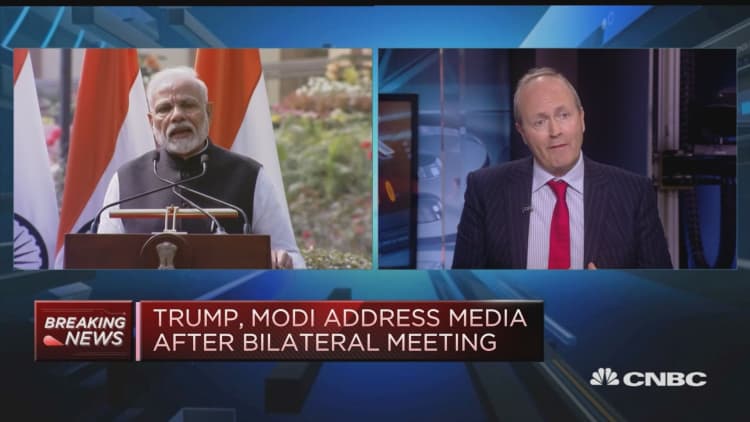WASHINGTON — The White House ratcheted up its war of words against Huawei on Tuesday, as a senior administration official denounced the Chinese telecom as "the Mafia" and suggested it could spy on the British Parliament.
In comments to CNBC, the official denounced Huawei as an "utterly nonmarket player" that wants to wipe out competition through dumping, theft and racketeering.
"How do we deal with that when the largest player is in essence the Mafia?" said the official, who declined to be named due to the sensitivity of the subject. "What do you do? It means there is some kind of a role for government," he said. But the official declined to specify how the U.S. government will respond: "That conversation's still ongoing," he said.
The administration is working on ways to combat Huawei's dominance of emerging 5G telecommunications technology, as President Donald Trump seeks to clamp down on a Chinese hardware manufacturer that he sees as a spying threat to countries that use its equipment.
The White House has accused Huawei of including security vulnerabilities in its hardware that would allow Beijing access to information crossing the system. Officials have refused to disclose the intelligence behind the accusation, citing a need to protect sources and methods.
Huawei has denied allegations that it colludes with Chinese intelligence. A company spokesman rejected the senior administration official's "Mafia" comment.
"That's just crazy. We're one of the largest private enterprise run companies in the world. Our senior management is more akin to the way American executives think and act," said Glenn Schloss, vice president of corporate communications for Huawei. "To liken Huawei to organized crime is disingenuous, and a PR stunt. We're operating in 170 countries in the world connecting a third of the world's people. And we operate in a free market structure."
He added: "We do receive some subsidies R&D funding from the Chinese government, but it's not significant. We also receive subsidies and R&D funding from governments in Europe."
Administration officials in recent weeks have raised a number of possible ways to combat Huawei's rise. New acting Director of National Intelligence Richard Grenell suggested the United States would cut off intelligence cooperation with Germany if that country doesn't keep Huawei out of its telecommunications network. And federal prosecutors announced new charges this month against the company and two of its subsidiaries, including allegations of racketeering and plotting to steal trade secrets.
Attorney General William Barr suggested earlier this month that the United States might simply purchase controlling stakes in telecom manufacturers based in allied countries, such as Ericsson and Nokia.
White House acting chief of staff Mick Mulvaney broached the subject of Huawei with his counterparts at 10 Downing Street in London on Feb. 20 amid reports that Trump held an angry phone call with British Prime Minister Boris Johnson in the wake of the U.K.'s announcement that it would allow Huawei products in its 5G networks.
On Tuesday, the senior administration official voiced continued frustration with the British government, suggesting that it may be able to keep intelligence secrets safe from Huawei equipment, but would leave the rest of British society vulnerable to spying.
"So when the U.K. keeps saying, 'Oh no, we think we can protect our most precious secrets' — maybe, or maybe not," the official said. "And what about your people? Every single business that operates in your country — you've invited the Chinese Communist Party to view all of your data, all of your personal secrets, your corporate secrets. The British people know better. Their government usually does the right thing — sometimes after exhausting the alternatives."
The official also raised the prospect of the Chinese government developing the ability to blackmail members of the British Parliament.
"It's everything — it means that they're able to collect information to blackmail members of Parliament," the official said. "The degree of fidelity — it's like a pipeline into the private lives and thoughts of the entire British people and the people of any other country that goes this route."

White House aides have pointed to an analysis by the private firm Finite State, which concluded last year that "Huawei devices quantitatively pose a high risk to their users."
The firm said its analysis "discovered that there were hundreds of cases of potential backdoor vulnerabilities — improper default configurations that could allow Huawei or a malicious attacker to covertly access a user's device."
The senior administration official stressed that kind of vulnerability presents a threat to Western countries.
"Think of how powerful the data is from Huawei," he said. "Can you fathom the power of that data in the hands of a country that has zero accountability to the rule of law and has every reason to want to exploit that data for nefarious purposes?"
On a related issue, a second senior administration official who declined to be named said the Trump White House is considering expelling Chinese reporters from the United States, in retaliation for that country's ejection of three Wall Street Journal journalists.
Asked during a press briefing Tuesday in India whether he is considering banning or restricting access for Chinese journalists, Trump said: "We'll have a decision made on that relatively soon."
CNBC's Brad Quick contributed to this article.


